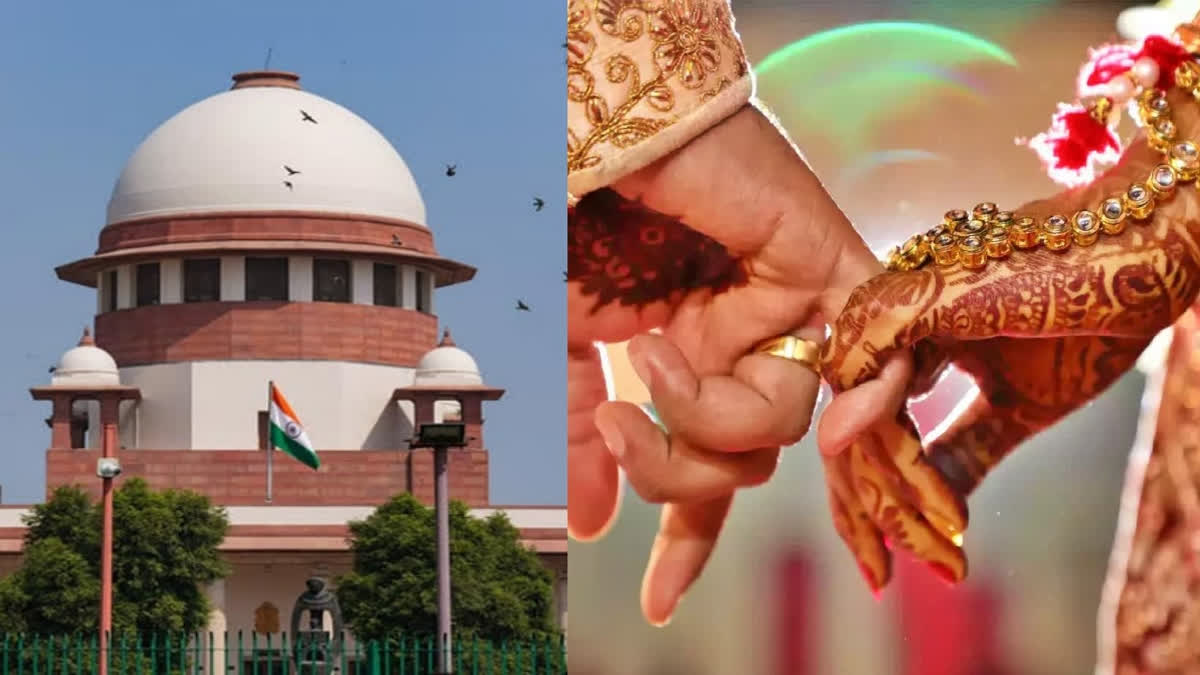New Delhi: The Supreme Court has said that it would not be desirable to accept the formula of “irretrievable breakdown of marriage” as a strait-jacket formula for the grant of relief of divorce under Article 142 of the Constitution of India.
The apex court stressed that despite the increasing trend of filing divorce proceedings in the courts of law, the institution of marriage is still considered to be a pious, spiritual, and invaluable emotional life net between the husband and the wife in Indian society. A bench of Justice Aniruddha Bose and Justice Bela M Trivedi was considering a plea for divorce by an 89-year-old man from his wife 82 years. The woman had expressed her desire to continue in the marriage after which the Court refused to grant divorce.
The bench was considering a question: “Should the irretrievable breakdown of marriage necessarily result in the dissolution of marriage in the exercise of powers under Article 142 of the Constitution of India, when such is not a ground for divorce under the Hindu Marriage Act 1955?” In a judgment passed on October 10, the bench said: “One should not be oblivious to the fact that the institution of marriage occupies an important place and plays an important role in society”.
Justice Trivedi, who authored the judgment on behalf of the bench, said despite the increasing trend of filing divorce proceedings in the courts of law, the institution of marriage is still considered to be a pious, spiritual, and invaluable emotional life net between the husband and the wife in the Indian society. “It is governed not only by the letters of law but by the social norms as well. So many other relationships stem from and thrive on the matrimonial relationships in the society”, said Justice Trivedi.
She said therefore, it would not be desirable to accept the formula of “irretrievable breakdown of marriage” as a strait-jacket formula for the grant of relief of divorce under Article 142 of the Constitution. In the present case, the bench noted that the husband is aged about 89 years and respondent-wife is aged about 82 years, and the wife “all throughout her life has maintained the sacred relationship since 1963 and has taken care of her three children all these years, despite the fact that the appellant-husband had exhibited total hostility towards them”.
The bench noted that the wife is still ready and willing to take care of her husband and does not wish to leave him alone at this stage of life. “She has also expressed her sentiments that she does not want to die with the stigma of being a ‘divorcee’ woman. In contemporary society, it may not constitute to be stigma but here we are concerned with the respondent’s own sentiment”, said the bench.
Justice Trivedi said, considering and respecting the sentiments of the wife, the court is of the opinion that exercising the discretion in favour of the “appellant (husband) under Article 142 by dissolving the marriage between parties on the ground that the marriage has irretrievably broken down, would not be doing ‘complete justice’ to the parties, would rather be doing injustice to the respondent (wife)”.
Dismissing the appeal filed by the husband, the bench said, “we are not inclined to accept the submission of the appellant to dissolve the marriage on the ground of irretrievable breakdown of marriage”. The bench referred to the recent constitution bench decision in the case of Shilpa Shailesh vs. Varun Sreenivasan, which said that the power under Article 142 may be exercised with great care and caution to do complete justice.
The apex court held that it can exercise its discretion under the inherent powers under Article 142 of the Constitution for dissolving a marriage on the ground of ‘irretrievable breakdown of marriage’, even when one of the spouses opposes the dissolution of marriage. However, the court said that such discretion must be exercised with great care and caution, it added.
The apex court’s judgment came on a plea for divorce by a husband, who is a qualified doctor and retired as Wing Commander, from his wife, who was working in a central school and retired now.
The husband had filed the divorce proceedings in March 1996 before the district court, Chandigarh on two grounds, namely ‘cruelty’ and ‘desertion’ as contemplated in Section 13(1) (ia) and 13(1)(ib) respectively of the Hindu Marriage Act 1955. The husband moved the apex court against the 2009 Punjab and Haryana High Court order where the division bench of the high court confirmed the judgment and decree dated December 21, 2000, passed by the single bench of the high court in favour of the wife. The wife moved the high court against the trial court order dissolving the marriage between the parties under Section 13 of the Act.
Also read: SC bench disagrees on abortion of 26-week pregnancy of married woman, refers matter to larger bench



